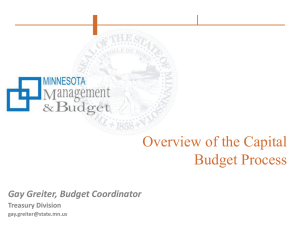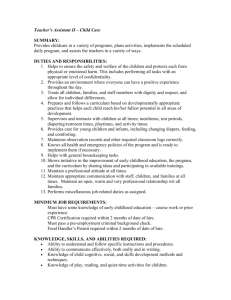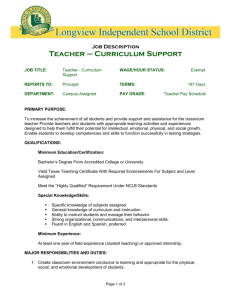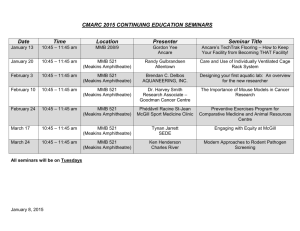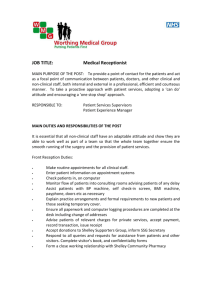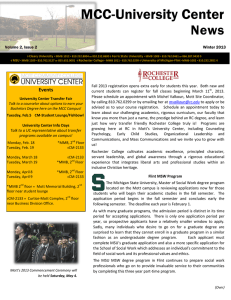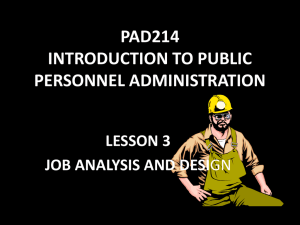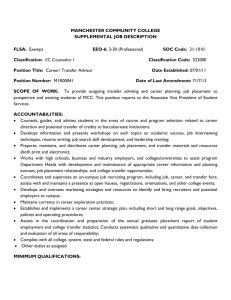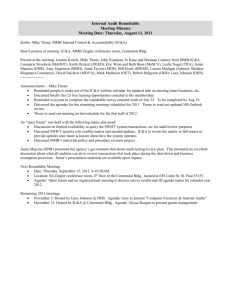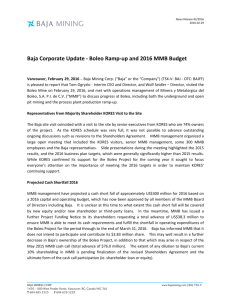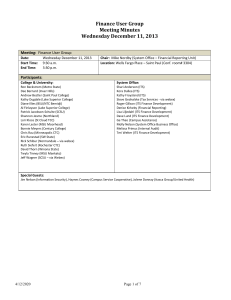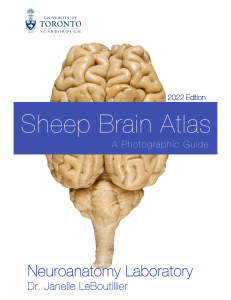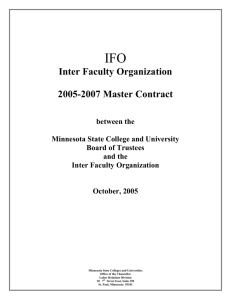Risk Assessment Procedure
advertisement
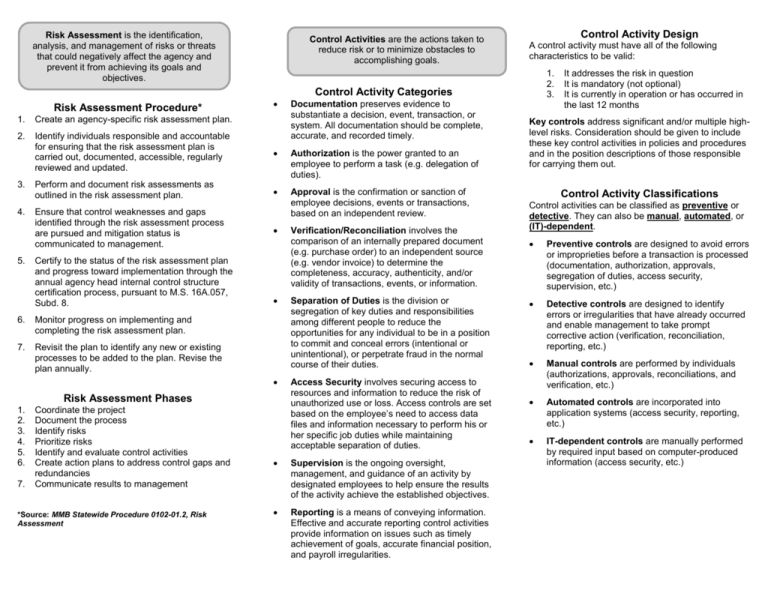
Risk Assessment is the identification, analysis, and management of risks or threats that could negatively affect the agency and prevent it from achieving its goals and objectives. Control Activities are the actions taken to reduce risk or to minimize obstacles to accomplishing goals. Control Activity Design A control activity must have all of the following characteristics to be valid: 1. 2. 3. Control Activity Categories Risk Assessment Procedure* Documentation preserves evidence to substantiate a decision, event, transaction, or system. All documentation should be complete, accurate, and recorded timely. 1. Create an agency-specific risk assessment plan. 2. Identify individuals responsible and accountable for ensuring that the risk assessment plan is carried out, documented, accessible, regularly reviewed and updated. Authorization is the power granted to an employee to perform a task (e.g. delegation of duties). Perform and document risk assessments as outlined in the risk assessment plan. Approval is the confirmation or sanction of employee decisions, events or transactions, based on an independent review. 3. 4. 5. Ensure that control weaknesses and gaps identified through the risk assessment process are pursued and mitigation status is communicated to management. Certify to the status of the risk assessment plan and progress toward implementation through the annual agency head internal control structure certification process, pursuant to M.S. 16A.057, Subd. 8. 6. Monitor progress on implementing and completing the risk assessment plan. 7. Revisit the plan to identify any new or existing processes to be added to the plan. Revise the plan annually. Risk Assessment Phases 1. 2. 3. 4. 5. 6. 7. Coordinate the project Document the process Identify risks Prioritize risks Identify and evaluate control activities Create action plans to address control gaps and redundancies Communicate results to management *Source: MMB Statewide Procedure 0102-01.2, Risk Assessment Verification/Reconciliation involves the comparison of an internally prepared document (e.g. purchase order) to an independent source (e.g. vendor invoice) to determine the completeness, accuracy, authenticity, and/or validity of transactions, events, or information. Separation of Duties is the division or segregation of key duties and responsibilities among different people to reduce the opportunities for any individual to be in a position to commit and conceal errors (intentional or unintentional), or perpetrate fraud in the normal course of their duties. Access Security involves securing access to resources and information to reduce the risk of unauthorized use or loss. Access controls are set based on the employee’s need to access data files and information necessary to perform his or her specific job duties while maintaining acceptable separation of duties. Supervision is the ongoing oversight, management, and guidance of an activity by designated employees to help ensure the results of the activity achieve the established objectives. Reporting is a means of conveying information. Effective and accurate reporting control activities provide information on issues such as timely achievement of goals, accurate financial position, and payroll irregularities. It addresses the risk in question It is mandatory (not optional) It is currently in operation or has occurred in the last 12 months Key controls address significant and/or multiple highlevel risks. Consideration should be given to include these key control activities in policies and procedures and in the position descriptions of those responsible for carrying them out. Control Activity Classifications Control activities can be classified as preventive or detective. They can also be manual, automated, or (IT)-dependent. Preventive controls are designed to avoid errors or improprieties before a transaction is processed (documentation, authorization, approvals, segregation of duties, access security, supervision, etc.) Detective controls are designed to identify errors or irregularities that have already occurred and enable management to take prompt corrective action (verification, reconciliation, reporting, etc.) Manual controls are performed by individuals (authorizations, approvals, reconciliations, and verification, etc.) Automated controls are incorporated into application systems (access security, reporting, etc.) IT-dependent controls are manually performed by required input based on computer-produced information (access security, etc.) MS 16A.057 INTERNAL CONTROLS AND INTERNAL AUDITING Definitions Risk is the possibility of an event occurring that will have a negative impact on the achievement of objectives. Risk is measured in terms of impact and likelihood. Inherent Risk is the probability of a loss arising out of a negative event or existing in the current environment before mitigating steps (i.e. control activities) are taken to reduce the possibility of occurrence. Residual Risk is the risk remaining after management takes action to prevent or reduce the impact and/or likelihood of a negative event occurring. Risk Response and Mitigation Strategies Control/Reduce/Mitigate – Risk can be reduced by putting control activities into place to ensure that all significant risks have been addressed. Transfer – Risk can be transferred by having someone else assume it. However, the entity transferring the risk often remains ultimately responsible for the final outcome. Avoid – Risk can be avoided by choosing not to engage in the activity. However, in government it is impossible to avoid activities mandated by the legislature. Accept – Significant risks can be reduced, mitigated, or transferred. Low or residual risks can be accepted. This occurs when the agency chooses to deal with the consequences of the risk if it occurs. Some Questions to Ask When Attempting to Identify Risks: 1. 2. 3. 4. 5. 6. What can go wrong? How could we fail? What must go right for us to succeed? Where are we vulnerable? What activities are most complex? What is our greatest legal exposure? Subd. 8. Agency head responsibilities. The head of each executive agency is responsible for designing, implementing, and maintaining an effective internal control system within the agency. The head of each executive agency must annually certify that the agency head has reviewed the agency’s internal control systems, and that these systems are in compliance with standards and policies established by the commissioner. The agency head must submit the signed certification form to the commissioner of management and budget, in a form specified by the commissioner. MMB Statewide Procedure 0102-01.2 RISK ASSESSMENT Risk assessment is one component of the COSO Internal Control Integrated Framework and is vital to an effective internal control system. Risk assessments must be performed on all high profile key processes in order to support the agency head’s annual certification of internal control structure, pursuant to Minn.Stat.Section 16A.057, Subd.8. The agency’s risk assessment plan identifies the specific processes for which risk assessments must be performed and documented. The plan must be comprehensive and sufficient enough in scope to support the agency’s certification of internal control structure. This procedure is applicable to all cabinet level agencies and other executive branch agencies, based on size and inherent business risk. Guide to Risk Assessment and Control Activities (http://www.beta.mmb.state.mn.us/risk-assessment) Risk Assessment Planning: Process Definitions (http://www.beta.mmb.state.mn.us/risk-intro) Risk Assessment Planning: Factors for Consideration When Prioritizing Processes (http://www.beta.mmb.state.mn.us/risk-intro) Risk Assessment: A Quick Reference Guide A Key to an Effective Internal Control System A publication of Minnesota Management & Budget Internal Control and Accountability Unit www.mmb.state.mn.us/ic
